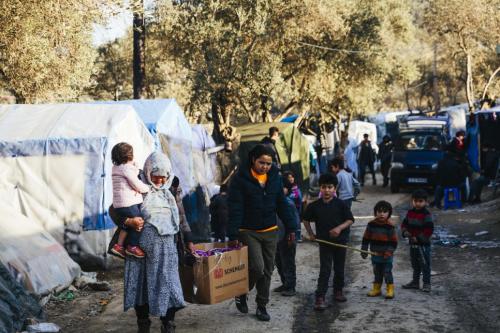Act now to alleviate suffering at reception centres on Greek islands - UNHCR’s Grandi
UN High Commissioner for Refugees Filippo Grandi, on Febuary 21, called for urgent action to address the increasingly desperate situation of refugees and migrants in reception centres in the Aegean islands.

An elderly Afghan asylum-seeker and her daughter outside Moria, on the Greek island of Lesvos.
Conditions in facilities on Lesbos, Chios, Samos, Kos and Leros are woefully inadequate, and have continued to deteriorate since Grandi last visited in November. Mediterranean arrivals into Europe have plummeted since the 2015 crisis, but arrivals to Greece have risen in the last year and made chronic overcrowding on the islands much worse.
Grandi has welcomed recent efforts by the Greek Government to address the situation, noting a series of priority measures announced this month. However, it will inevitably take some time for the planned measures to be fully enacted. Decisive action is urgently needed to alleviate overcrowding through large-scale transfers of asylum seekers to the mainland, where additional reception capacity must be found quickly.
“Conditions on the islands are shocking and shameful,” said Filippo Grandi, UN High Commissioner for Refugees. “Greece – with European support – has to act now to deal with an untenable situation, while the longer-term measures are put in place.”
Winter weather is now also adding to the suffering on the islands. Many people are without power, and even water, living amid filth and garbage. Health services are negligible. The risks faced by the most vulnerable individuals, pregnant women, new mothers, the elderly and children are among the worst seen in refugee crises around the world.
Action is also needed to address the understandable concerns of the local communities hosting the refugees and migrants, to avoid social tensions rising still further.
And of course, Greece should not be left alone. The European Union (EU) has provided essential and continuous support to Greece through European Commission funding and its agencies such as the European Asylum Support Office. These resources are still needed, but so are responsibility-sharing measures such as the relocation of unaccompanied children and other vulnerable people. Since the end of the emergency relocation scheme in September 2017, only a handful of European countries have pledged to take asylum seekers and refugees from Greece under relocation and expedited family reunion.
To address the critical situation on the islands, UNHCR is today appealing to the Greek Government, the EU, and European States to:
● Urgently reduce the crowding and risks by ensuring additional reception places on the mainland for at least 20,000 people and move them there as quickly as possible.
● Improve living conditions for those who remain on the islands, prioritizing water, sanitation and healthcare.
● Help unaccompanied children by relocating them elsewhere in Europe and by allowing them to reunite with their families.
● Focus on ensuring that asylum procedures are not just faster, but fair and proper too.
● Include safeguards in the imminent revision of the asylum law and its application.
● Invest in long-term solutions for those people who are recognized as refugees, by giving them the opportunity to become self-reliant.
UNHCR is ready to support Greece in search of solutions to address this complex situation.
Source: United Nations High Commissioner for Refugees
- 192 reads
Human Rights
Ringing FOWPAL’s Peace Bell for the World:Nobel Peace Prize Laureates’ Visions and Actions

Protecting the World’s Cultural Diversity for a Sustainable Future

The Peace Bell Resonates at the 27th Eurasian Economic Summit

Declaration of World Day of the Power of Hope Endorsed by People in 158 Nations

Puppet Show I International Friendship Day 2020

